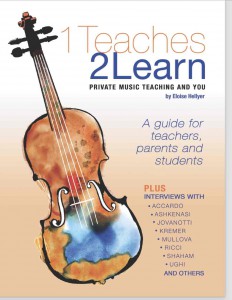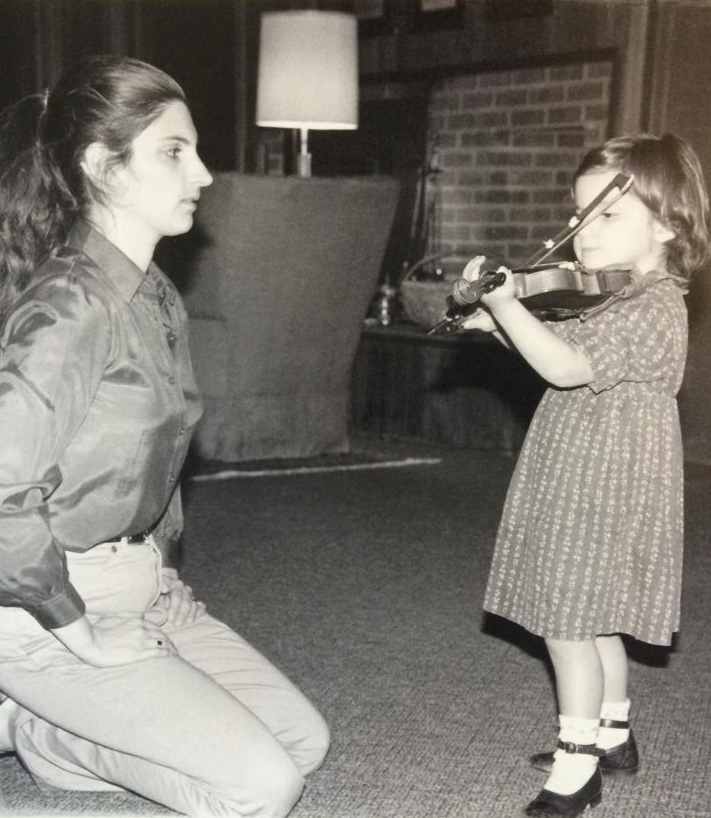Simple Questions, Profound Impact
I participate in Quora, an online forum. When you can overlook the ridiculous political rantings and ravings, there are lots of interesting questions and answers on a vast array of subjects. One question I saw recently was:
“Did you ever say something very simple that had a profound impact on someone in an unexpected manner?”
That made me remember one particular interaction with a student many years ago that still gives me chills when I think about it. But first, a preamble.
Having had the privilege of interviewing a number of well-known and famous violinists and musicians, one point kept coming up in our conversations: that it’s important for students to have a personal relationship with their teachers—something that many of these artists felt the lack of in their own training. Either their teachers weren’t there regularly, they were too businesslike, too rigid, or were teaching the instrument instead of the student, to name a few examples they cited.
Teaching can indeed be very business-like, which would be fine if we were actually doing business with our students. But if you think of it, even when we are doing real business transactions in our daily lives, we make a lot of business decisions based on personal relationships we form with the people involved: picking the realtor to sell our house, the salesman from whom we bought a car, sealing a deal with a handshake, etc. So why is it that many of us teachers are afraid to “waste time” talking to our students? Is it because we want parents to feel they’re getting their money’s worth? We want to seem professional? We want to get results as quickly as possible? Well, let me assure you, developing a relationship with your students is not a waste of time although some parents may seem to think so at the outset. (Don’t worry, they’ll catch on.) It also doesn’t take much time to do so, either, and, strange as it may seem, may really improve your results.
First, we should define what we mean by a personal relationship. Or rather, what it isn’t in the teacher/student relationship. It’s not a love or emotional relationship as in a family, and it isn’t friendship. So what is it?
Trust.
Just as in the decisions above, your students have to trust you. How do they learn to trust you? Here are a few ways I have learned over the years:
- You make a point of spending a least 10 – 30 seconds at the beginning of the lesson to find out how they are, how their week went, how’s school, etc., showing that you are interested in them as human beings instead of objects there to be instructed. Children don’t always get this from adults.
- You make sure they understand that you respect them. That means you are collaborating, not dictating. If they’re not great practicers, you talk to them about it, perhaps relating your own personal difficulties when you were young, (besides, who among us was always a perfect music student?) instead of issuing ultimata.
- You tell them stories to illustrate your teaching points: you make it personal. Talk about your own training and how you had trouble learning how to keep a flexible thumb on the bow, for example. Tell stories about famous violinists or musicians you have met, heard about, or seen perform – even if it was 50 years ago. Kids love stories—stories that illustrate your teaching point but especially funny ones. So . . .
- Use your sense of humor when appropriate. This lets them know you are human, too. (They often tend not to see teachers that way.)
- That when you praise them or bawl them out, they know it’s because they deserve it and not because you are in a good or bad mood. In other words, they can trust you to tell them the truth and that it is not colored by how you may feel physically or emotionally that day. They often don’t get this from other adults in their lives, either.
- You try to keep a regular schedule with them as much as you possibly can. Children need routine; they need to know that you are there for them at the same time each week.
- You don’t judge their character or personality. You criticize (and praise) what they do, not what they are.
So having developed trust with your students, you can sometimes permit yourself to intervene in their personal lives when you feel it is necessary, or it becomes obvious that you are the only one who can intervene. Why? You are in a very intense one-on-one relationship with your students. You know them better than anyone else, even better than their parents sometimes. You are also disinterested—you may love them in a philosophical way, but not emotionally. Therefore, your view of them is not colored by whether or not they love or like you. You have a pretty good and balanced perspective. This is, in short, a unique relationship in your students’ lives—one they will always remember even after they forget who their middle school English teacher was. You have earned their trust and, most importantly, you may be the only adult they will listen to and feel may listen to and understand them. Scary, huh?
Well, the following story is scary.
I once had a 15-year-old student who became anorexic about a year after I had started teaching her. Every week for months and months, she got thinner and thinner until she was almost skeletal and her cycle had stopped. I spoke to her parents who were beside themselves with worry. It was heart-wrenching; her mother told me, “You have no idea how hard it is to watch your daughter commit suicide.” What can you say to that? As you may know, a very high percentage of anorexics die young, even if they’re cured, because of the often permanent damage they do to their bodies. And they are very difficult to cure. I felt I had to do something. I had a good relationship with this student, but these situations can be tricky. Desperate times, desperate measures, so I decided to speak to her anyway.
I asked her if something were bothering her. She said yes, but didn’t want to go into specifics. With gentle questioning, I did get her to tell me that her father wasn’t behaving properly toward her (not physical or verbal abuse). The universe intervened here and made me ask her a question I surely wouldn’t have thought of on my own: “Do you think people who behave badly are happy?” She answered that she thought they were not. So I asked, “Then do you then think your father is happy?” She replied that he most probably was not. “So,” I replied, “don’t you think you should have compassion for your father?” She looked thoughtful, we went on with and finished the lesson, and she went home.
The next morning, her mother called me and said, “I don’t know what you said to my daughter, but she came home from her lesson last night and asked for help.” She was then treated by a specialist in these problems, recovered, and now, some 25 years later, she is normal weight, a professional, and married with two children. I run into her mother every now and then in the local shopping center. She always gives me a great big hug.
As much as I would like to take credit for this, I am sure that that inspired questioning came from somewhere other than my inept brain. However, I still tremble when I think how those three simple questions changed, or probably saved, the life of that young woman. But wherever the inspiration came from, the terrain for it was fertile. I had developed a personal relationship with her—something I instinctively did with all my students.* She trusted me and I trusted her intelligence and, yes, compassion. She didn’t want to tell me the particulars of her problem with her father, and I respected that and didn’t press her once I was sure it wasn’t real abuse. I never mentioned her eating problems to her, as I knew it wouldn’t have helped; she would have felt that I was giving her the same lecture she was getting from everyone else, would have felt defensive, and then would have lost her trust in me.
This example is extreme, I know. But I still get weak in the knees when I think of it. What would have become of her if no one had spoken to her the way I did? Her parents, her schoolteachers, her parish priest had been getting nowhere with her—she kept getting thinner and thinner, refusing any help, or even acknowledging there was a problem. What other relationship did she have with an adult, or indeed anyone, which would have permitted such an exchange?
Fellow teachers, our relationships with and influence on our students are often far more important and have more far-reaching effects than we can possibly imagine. But it isn’t going to happen if we don’t take the time to interact with our students in their lessons as fellow human beings. It doesn’t take much time or effort and, as you can see, it can make a profound difference in their lives.
Actually, I don’t think I have ever been the same either since that exchange; I am ever more in awe of the power of teaching.
Post author: Eloise Hellyer
*It was instinctive then. Ever since that experience, I make a point of it consciously.
Share this:
Buy it on www.sharmusic.com - eBook format, avaliable worldwide, paperback in North America
COPYRIGHT
ABOUT
A music teacher’s thoughts and observations on the teaching and the study of a musical instrument, hoping to be of help to parents, students and teachers.
PHOTO
AWARDED TOP 25 VIOLIN BLOG
CATEGORIES
TAGS
ARCHIVES
-
Agosto 2022
Agosto 2023
Agosto 2024
April 2015
April 2016
April 2017
April 2019
April 2020
Aprile 2022
Aprile 2023
Aprile 2024
August 2014
August 2015
August 2016
August 2017
August 2018
August 2019
August 2021
December 2014
December 2015
December 2016
December 2017
December 2018
December 2019
December 2020
Dicembre 2022
Dicembre 2023
Dicembre 2024
Febbraio 2022
Febbraio 2023
Febbraio 2024
February 2015
February 2016
February 2018
February 2019
February 2020
February 2021
Gennaio 2022
Gennaio 2023
Gennaio 2024
Giugno 2022
Giugno 2022
Giugno 2023
Giugno 2024
January 2015
January 2016
January 2017
January 2018
January 2019
January 2020
July 2015
July 2017
July 2019
June 2016
June 2017
June 2018
June 2019
June 2020
June 2021
Luglio 2022
Luglio 2023
Luglio 2024
Maggio 2022
Maggio 2023
Maggio 2024
March 2015
March 2016
March 2017
March 2018
March 2019
March 2020
March 2021
Marzo 2022
Marzo 2023
Marzo 2024
May 2015
May 2016
May 2018
May 2019
May 2020
November 2014
November 2015
November 2016
November 2017
November 2018
November 2019
November 2021
Novembre 2022
Novembre 2023
Novembre 2024
October 2014
October 2015
October 2017
October 2018
October 2019
October 2020
October 2021
Ottobre 2022
Ottobre 2023
Ottobre 2024
September 2014
September 2015
September 2016
September 2018
September 2019
September 2020
September 2021
Settembre 2022
Settembre 2023
Settembre 2024
RECENT POSTS
Terry G and Me, or Terry Gilliam on Where (or What) Practicing the Piano Will Get You…
The Teaching We Don’t Do Is More Important Than We Think
Overwhelmingness or What Teaching and Motherhood* Have in Common
Cellphone Serenity
How to Build Your Reputation – the Kind You Want
Desperate Times, Desperate Measures. Or How to Deal With Your Strong-Willed Stubborn Student and Survive
“Why Does My Teacher Get So Frustrated?” Letter to a Perplexed Student
Mount Rush-no-more….And How to Get There
Realizzato con VelociBuilder - Another Project By: Marketing:Start! - Privacy Policy




